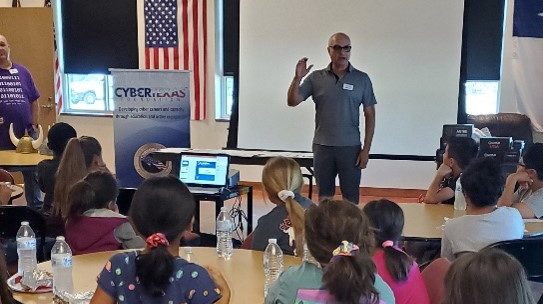San Antonio’s CyberPatriot Community Rallies to Support Students in Uvalde, Texas
July 21, 2022 | By Patrick Reardon
By Patrick Reardon
In response to the tragedy at Robb Elementary School in Uvalde, Texas, last May, an extensive network of STEM organizations assembled to provide a cybersecurity education camp for students of the rural Texas town. The initiative was spearheaded by the CyberTexas Foundation, a San Antonio-based nonprofit that is helping develop the next generation of cybersecurity workforce with one of the most successful and populous CyberPatriot programs in the country.
The camp, SA Cyber4 Uvalde, was planned in a matter of weeks through a concentrated effort between the Air & Space Forces Association, CyberTexas, the University of Texas at San Antonio, Alamo chapter of AFCEA and many other individuals and organizations. The one-day camp was held at El Progreso Memorial Library on June 23 for nearly 40 local elementary school students in Uvalde.
The idea came out of a conversation between Joe Sánchez, founder and executive director of CyberTexas, and Dr. Ricardo Romo, former president of UTSA. As the two discussed ways to help Uvalde’s affected independent school district, Sánchez suggested they follow what was done to build a CyberPatriot program at the library in Hondo, a town about halfway between Uvalde and San Antonio. The next thing they knew, planning and preparation for the first SA Cyber4 Uvalde camp was underway.
“It didn’t take much to convince my staff, nor the people in town,” Sánchez said. “They couldn’t say ‘yes’ fast enough. People were wanting to do something.”

Joe Sánchez, the Founder & Executive Director of the CyberTexas Foundation, addresses the students at the beginning of the CyberCamp with Frank Hall, civil servant for the Air Force and the CyberPatriot coach for the Hondo team and Medina Valley’s AFJROTC team, on the left of the photo. Photo courtesy of Diana Orozco, one of CyberTexas’ lead volunteers.
An outpouring of volunteers and organizations rushed to secure the resources and funding between late May and the first camp in June. The Alamo chapter of AFCEA provided financial support needed to host the camp and give the kids breakfast, lunch, and snacks including a snow cone machine at the end of the day. UTSA’s Center for Infrastructure and Assurance (CIAS), led by Dr. Greg White, provided the camp with decks of Cyber Protector and Cyber Guardian, a series of multiplayer card games that teach students foundations of IT, cybersecurity terminology, the relationships between cyber-attacks and cyber-defense, history of the STEM field, and more.
The program was also supported by volunteer mentors, mostly from the San Antonio Air Force community and industry partners in the surrounding area. One key volunteer was Frank Hall, a civil servant for the Air Force and the CyberPatriot coach for the Hondo team and Medina Valley’s AFJROTC team. Sporting his trademark “Cyber Viking” helmet, Hall led the young campers through the UTSA card games, online safety practices from the National Center for Missing & Exploited Children, and CyberPatriot worksheets he adapted for the program.
“Just to hear … that [we were] able to provide a break from all that stress they’ve been experiencing and just to hear ‘em laugh, to see ‘em smiling, and know they’re enjoying being there—that’s what got to me,” Hall said.
Sánchez attributes the level of response to the dutiful, family-like network of STEM, cyber, and military professionals in the area that he and Hall have been part of for decades.
“We have a very solid, strong, cohesive, collaborative network in San Antonio,” Sánchez said. “It was wonderful to see [the volunteers] engaging with the students, and it was very enlightening and emotional for me, just simply knowing what these kids had gone through.”
SA Cyber4 Uvalde is returning to town on Thursday, June 21 for a second camp aimed at middle school students. The curriculum will involve higher-level CyberPatriot presentations on topics like cyber ethics, an intro to IT, and applying the Cyber Threat Defender card game to real-life scenarios using CyberPatriot’s virtual imaging demo.
But these camps are just the beginning of SA Cyber4 Uvalde—Sánchez and Hall have already identified future opportunities to support computer science and cybersecurity education in Uvalde, both in the form of helping develop a cybersecurity class at the town’s high school this fall and in national CyberPatriot competitions. Their hope is that before this year’s CyberPatriot deadline closes in October, Uvalde will have teams representing their high school and middle school.
And there’s no better time to support student futures in Uvalde.
“Not only [does this program] foster a pathway for these kids as they get older and go to high school and graduate, which is the ultimate goal,” says Hall, “but it provides some awareness for them to [know] there are people outside Uvalde that care about what happened.”